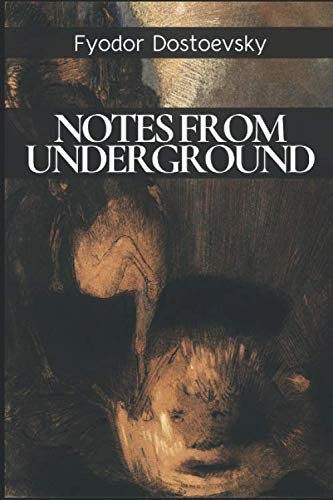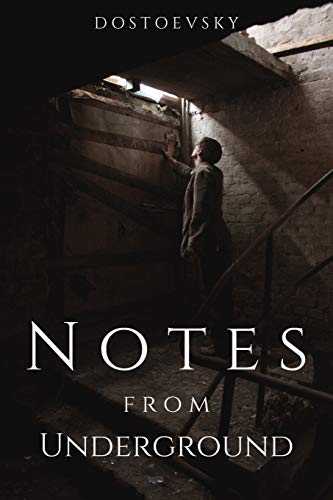-
Notes from Underground
Fyodor Dostoevsky
Paperback (Independently published, July 16, 2020)Written in reaction to Nikolay Chernyshevsky’s ideological novel What Is to Be Done? (1863), which offered a planned utopia based on “natural” laws of self-interest, Notes from the Underground attacks the scientism and rationalism at the heart of Chernyshevsky’s novel. The views and actions of Dostoyevsky’s underground man demonstrate that in asserting free will humans often act against self-interest. The underground man is profoundly alienated from life, entombed in his room. The hero’s views are outlined in Part I, and Part II describes the underground man’s conflicts. When he turns to reason for salvation, it fails him, and he concludes that not reason but caprice ultimately prevails in human nature.
-
Notes from Underground
Fyodor Dostoevsky
Paperback (Independently published, July 24, 2019)First published in 1864 by Fyodor Dostoevsky, Notes from Underground represents itself as the rambling memoirs of an embittered and isolated Russian civil servant living in Saint Petersberg. Dostoevsky employs the persona of the unnamed narrator to attack the reigning philosophies of the time.
-
Notes From the Underground
Fyodor Dostoyevsky
eBook (Digireads.com, April 3, 2004)A predecessor to such monumental works as "Crime and Punishment" and "The Brothers Karamazov", "Notes From Underground" represents a turning point in Dostoyevsky's writing towards the more political side. In this work we follow the unnamed narrator of the story, who disillusioned by the oppression and corruption of the society in which he lives withdraws from that society into the underground. A dark and politically charged novel, "Notes From Underground" shows Dostoyevsky at his best.
-
Notes From Underground
Fyodor Dostoyevsky
Paperback (Digireads.com, Jan. 1, 2006)A predecessor to such monumental works such as Crime and Punishment and The Brothers Karamazov, Notes From Underground represents a turning point in Dostoyevsky's writing towards the more political side. In this work we follow the unnamed narrator of the story, who disillusioned by the oppression and corruption of the society in which he lives withdraws from that society into the underground. A dark and politically charged novel, "Notes From Underground" shows Dostoyevsky at his best.
-
Notes From The Underground: Color Illustrated, Formatted for E-Readers
Fyodor Dostoyevsky, Leonardo
eBook (HMDS printing press, Aug. 31, 2015)How is this book unique? Formatted for E-Readers, Unabridged & Original version. You will find it much more comfortable to read on your device/app. Easy on your eyes.Includes: 15 Colored Illustrations and BiographyNotes from Underground (Russian: Записки из подполья, Zapiski iz podpol'ya), also translated as Notes from the Underground or Letters from the Underworld, is an 1864 novella by Fyodor Dostoyevsky. Notes is considered by many to be the first existentialist novel.[citation needed] It presents itself as an excerpt from the rambling memoirs of a bitter, isolated, unnamed narrator (generally referred to by critics as the Underground Man) who is a retired civil servant living in St. Petersburg. The first part of the story is told in monologue form, or the underground man's diary, and attacks emerging Western philosophy, especially Nikolay Chernyshevsky's What Is to Be Done?. The second part of the book is called "Àpropos of the Wet Snow", and describes certain events that, it seems, are destroying and sometimes renewing the underground man, who acts as a first person, unreliable narrator.It consists of an introduction, three main sections and a conclusion. (i) The short introduction propounds a number of riddles whose meanings will be further developed. Chapters two, three and four deal with suffering and the enjoyment of suffering; (2) chapters five and six with intellectual and moral vacillation and with conscious "inertia"-inaction; chapters seven through nine with theories of reason and logic; (c) the last two chapters are a summary and a transition into Part 2.War is described as people's rebellion against the assumption that everything needs to happen for a purpose, because humans do things without purpose, and this is what determines human history.Secondly, the narrator's desire for happiness is exemplified by his liver pain and toothache. This parallels Raskolnikov's behavior in Dostoyevsky's later novel, Crime and Punishment. He says that, due to the cruelty of society, human beings only moan about pain in order to spread their suffering to others. He builds up his own paranoia to the point he is incapable of looking his co-workers in the eye.The main issue for the Underground Man is that he has reached a point of ennui and inactivity. Unlike most people, who typically act out of revenge because they believe justice is the end, the Underground Man is conscious of his problems, feels the desire for revenge, but he does not find it virtuous; this incongruity leads to spite and spite towards the act itself with its concomitant circumstances. He feels that others like him exist, yet he continuously concentrates on his spitefulness instead of on actions that would avoid the problems he is so concerned with. He even admits at one point that he’d rather be inactive out of laziness.The first part also gives a harsh criticism of determinism and intellectual attempts at dictating human action and behavior by logic, which the Underground Man mentions in terms of a simple math problem two times two makes four (see also necessitarianism). He states that despite humanity’s attempt to create the "Crystal Palace," a reference to a famous symbol of utopianism in Nikolai Chernyshevsky’s What Is to Be Done?, one cannot avoid the simple fact that anyone at any time can decide to act in a way which might not be considered to be in his or her interests; and some will do so simply to validate their existence and to protest and confirm that they exist as individuals. For 'interests' as a general term is subjective and in the case of the Underground Man the good here he's ridiculing is enlightened self-interest (egoism, selfishness). It is this latter position being depicted as logical and valid that the novel's protagonist despises. Since his romantic embracing of this ideal, he seems to blame it for his current base unhappiness.
-
Notes from Underground
Fyodor Dostoevsky
Paperback (BN Publishing, March 23, 2009)The passionate confessions of a suffering soul; the brutal self-loathing of a tormented man; the scathing scorn of an alienated antihero who has become one of the greatest figures in all literature. Notes from Underground, published in 1864, introduces the moral, political, and social ideas Dostoevsky later explores in such masterpieces as Crime and Punishment, The Idiot, and The Brothers Karamazov .
-
Notes from the Underground
Fyodor Mikhailovich Dostoevsky
Paperback (Cosimo Classics, June 1, 2010)A philosophical debate about human nature and life in a technological civilization in the form of the diary of a fictional civil servant, this 1864 novel is considered the foundational work of existentialist literature. Punishing himself through his refusal to seek medical treatment for his pain, the embittered, nameless narrator engages in what appears to be an attempt to prove to himself that human happiness can never be possible because people are too stubbornly individualistic not to assert themselves, even in wicked ways. One of the must-reads from Russian novelist FYODOR MIKHAILOVICH DOSTOEVSKY (1821-1881), this trailblazing work of modern literature offers a vital basis for understanding much of contemporary philosophy and pop culture, from Jean-Paul Sartre and Friedrich Nietzsche to Taxi Driver and American Psycho, all of which have taken inspiration from this extraordinary work.
-
Notes from the Underground
1821-1881 Dostoyevsky, Fyodor
eBook (HardPress, June 21, 2016)HardPress Classic Books Series
-
Notes from the Underground: Illustrated
FYODOR DOSTOYEVSKY
eBook (, Feb. 8, 2019)Notes from the Underground presents itself as an excerpt from the rambling memoirs of a bitter, isolated, unnamed narrator (generally referred to by critics as the Underground Man), who is a retired civil servant living in St. Petersburg. The first part of the story is told in monologue form, or the underground man's diary, and attacks emerging Western philosophy, especially Nikolay Chernyshevsky's What Is to Be Done? The second part of the book is called "Apropos of the Wet Snow" and describes certain events that appear to be destroying and sometimes renewing the underground man, who acts as a first person, unreliable narrator and anti-hero.
-
Notes from the Underground
Fyodor Dostoyevsky
Paperback (CreateSpace Independent Publishing Platform, June 5, 2017)Notes from the Underground by Fyodor Dostoyevsky. Worldwide literature classic, among top 100 literary novels of all time. A must read for everybody.In the 1980s, Italo Calvino (the most-translated contemporary Italian writer at the time of his death) said in his essay "Why Read the Classics?" that "a classic is a book that has never finished saying what it has to say", without any doubt this book can be considered a Classic This book is also a Bestseller because as Steinberg defined: "a bestseller as a book for which demand, within a short time of that book's initial publication, vastly exceeds what is then considered to be big sales".
-
Notes from the Underground
Fyodor Dostoevsky
Paperback (CreateSpace Independent Publishing Platform, Nov. 1, 2014)The late 19th century was a dynamic period for literature, and one of the most significant writers at that time was Fyodor Dostoevsky, whose Notes from Underground is considered by many to be the very first existential work of fiction. Published in 1864 in his native Russian (the first English translation would come much later in 1918), one of Dostoevsky’s most controversial narrators rambles, contradicts himself and bitterly describes his defiant, self-imposed isolation from society. The novella has two parts, and within those dual sections Dostoevsky presented to the world one of the first mature works of literary realism.
-
Notes from Underground
Fyodor Dostoyevsky
Hardcover (Amereon Ltd, June 1, 1976)This title comes from the award-winning translators of "Crime and Punishment", Richard Pevear and Larissa Volokhonsky. The apology and confession of a minor mid-19th-century Russian official, "Notes from Underground" is a half-desperate, half-mocking political critique and a powerful, at times absurdly comical, account of man's breakaway from society and descent 'underground'.